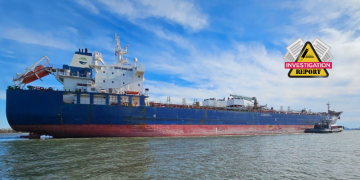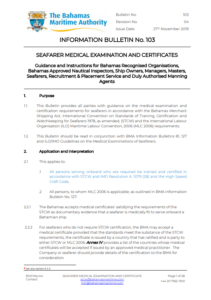The Bahamas Maritime Authority issued a bulletin providing all relevant parties with guidance on the medical examination and certification requirements for seafarers in accordance with the Bahamas Merchant Shipping Act, STCW as amended and ILO MLC (2006) requirements.
The Bahamas accepts medical certificates satisfying the requirements of the STCW as documentary evidence that a seafarer is medically fit to serve onboard a Bahamian ship.
Firstly, the Bahamas will accept a medical certificate following a medical examination carried out in accordance with the ILO/IMO Guidelines on the Medical Examinations of Seafarers by one of the following parties:
- Approved medical practitioners in The Bahamas. For this purpose, the medical practitioner must hold a valid medical approval certificate issued by the Bahamas Medical Council (BMC),
- Medical practitioners approved by the Administration of a country that has ratified and is party to either STCW or MLC 2006.
The BMA is aware that some Medical Companies conduct medical examinations for Company and specific industry employment purposes and that such medical examination may include requirements and/or standards that are not required by STCW or ILO provisions.
Medical certificates issued following such Company or industry specific employment examination may be accepted subject to:
- The medical practitioner being approved, by the BMC or an Administration of a STCW or MLC 2006 ratifying country, to conduct STCW or MLC 2006 examination. The certificate should have reference to the authorizing Administration or country.
- The medical certificate being in English and containing the information as noted in Section 5 of this Bulletin.
- The seafarer is not a Master, Chief Engineer, Chief Mate, Second Engineer, Officer in Charge of a Navigation Watch, Officer in Charge of an Engineering Watch, Electro-Technical Officer, Able Seafarer Deck or Engine, Electro-Technical Rating, Navigational or Engineering Rating, Offshore Installation Manager, Maintenance Supervisor, Barge Supervisor or Ballast Control Operator.
Where the medical examination is carried out in The Bahamas, the medical practitioner must hold a valid medical approval certificate issued by the BMC and the following process shall be followed:
- The seafarer must provide the medical practitioner with a photographic identity document and a copy of the last medical fitness certificate, if the medical examination is not the first examination,
- The seafarer shall advise the medical practitioner if he or she has previously failed a seafarer medical examination and/or any significant medical condition they may have, or medical treatment they are undergoing at the time of the examination,
- The medical practitioner shall undertake the medical examination and advise the seafarer of the outcome which should be recorded in the format as noted in Annex II. As the outcome is confidential, the content of this must not be provided to a third party unless specifically authorized by the seafarer. The seafarer shall be provided with a certificate as specified in Section 5 and Annex III of this Bulletin,
- The medical practitioner shall maintain records of the medical examination for six (6) years and such records shall be available for examination by the BMC or the BMA.
Subject to process outlined above, a medical examination maybe carried out onboard a Bahamian registered vessel subject to the following additional conditions:
- The medical practitioner must hold a valid medical approval certificate issued by the BMC or an Administration of a STCW or MLC 2006 ratifying country,
- The medical examination is conducted prior to the seafarer being assigned duties or in the case of a medical certificate that is due to expire, then prior to the expiry of that certificate,
- The medical practitioner has professional independence in exercising their medical judgment when undertaking medical examination procedures and the confidentiality of the seafarer is maintained with the outcome of the examination only being made available to the seafarer,
- The vessel has appropriate facilities and equipment to enable a medical examination to be carried out,
- The medical practitioner maintains records of all medical examination carried out,
- The BMA is advised of any seafarer who has failed a medical examination recognizing the provisions for an appeal.
The approved medical practitioners should be satisfied in each case that no disease or defect is present which could either be aggravated by working at sea or represent an unacceptable health risk to the individual seafarer, other crew members or the safety of the ship.
Apart from the purely medical aspects, the occupational circumstances which apply at sea should be fully considered, especially in any borderline case. Particular factors which should be taken into account are:
- the potentially hazardous nature of seafaring, which calls for a high standard of health and continuing fitness;
- the restricted medical facilities likely to be available on board some ships which may not carry a qualified medical Doctor and there maybe delay before full medical treatment is available;
- the possible difficulty of providing or replacing required medication. As a rule, a seafarer should not be accepted for service if the loss of a necessary medicine could precipitate the rapid deterioration of a medical condition;
- the confined nature of life on board ship and the need to be able to live and work in a closed community;
- the limited crew complements which mean that illness of one crew member may place a burden on others or impair the safe and efficient working of the ship;
- the potential need for crew members to play a role in an emergency or emergency drill, which may involve strenuous activity in adverse conditions;
- since many seafarers will need to join and leave ships by air, they should be free from any condition which precludes air travel or could be seriously affected by it, such as pneumothorax or conditions which predispose to barotraumas.
The approved medical practitioner should be satisfied that no condition is present which is likely to lead to problems during the voyage and no treatment is being followed which might cause adverse side effects.
It would be unsafe practice to allow a seafarer to go to sea with any known medical condition where there was the possibility of serious exacerbation requiring expert treatment.
Where medication is acceptable for seafarers, the individual seafarer should arrange for a reserve stock of the prescribed drugs to be held in a safe place, with the agreement of the ship’s master.
A seafarer whose certificate has expired during the course of a voyage may continue to work until the next port of call at which a medical examination can be conducted, or for up to three months from the date of expiry of the certificate, whichever period is earlier. The validity of the certificate cannot be extended.
Explore more herebelow:






























































